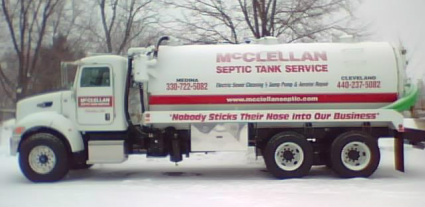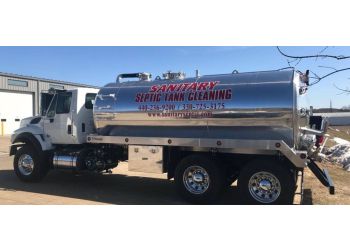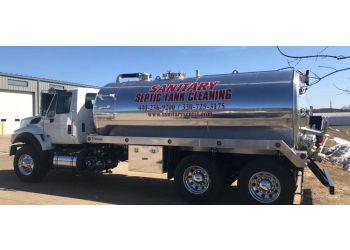Are you looking for reliable septic tank pumping services in Cleveland? Look no further! We are here to assist you with all your septic tank pumping needs. Our experienced team is dedicated to ensuring that your septic system is clean and functioning properly.
With our professional septic tank pumping services in Cleveland, you can rest assured that your system is in good hands. Regular pumping is essential to prevent backups and maintain the overall health of your septic system. Trust us to provide efficient and thorough services to keep your septic tank in optimal condition.
Choose us for all your septic tank pumping needs in Cleveland, and we guarantee your satisfaction. With our friendly and knowledgeable team, we make the process seamless and worry-free for you. Contact us today to schedule an appointment and keep your septic system running smoothly!

Importance of Regular Septic Tank Pumping
Understanding the Function of Septic Tanks
Septic tanks play a vital role in the proper disposal of wastewater from residential properties that are not connected to a municipal sewage system. They are underground structures that collect solid waste and separate it from the liquid waste before it is released into the drain field for further treatment. Regular septic tank pumping is essential to ensure the efficient operation of the system and prevent backups, odors, and costly repairs.
Why Regular Pumping is Essential
Over time, solid waste and sludge build up in the septic tank. If left unchecked, this accumulation can lead to clogged pipes, slow draining or backed-up plumbing fixtures, foul odors in the yard or house, and wet or mushy ground near the septic tank. Regular pumping is necessary to remove the accumulated waste and prevent these issues from occurring. Additionally, regular pumping helps maintain the balance of bacteria and enzymes in the tank which are responsible for breaking down the waste.
Signs that Your Septic Tank Needs Pumping
Slow Draining or Backed-Up Plumbing Fixtures
If you notice that your sinks, toilets, or showers are draining slowly or become completely backed up, it could be a sign that your septic tank needs pumping. As the tank fills up with solid waste, it reduces the capacity for liquid waste to drain properly, causing plumbing fixtures to be sluggish or clogged.
Foul Odors in the Yard or House
Unpleasant odors in your yard or house can indicate a septic tank issue. As waste accumulates in the tank, it starts to decompose and release foul-smelling gases. These gases can permeate through the soil, causing a strong and unpleasant odor both indoors and outdoors.
Wet or Mushy Ground near the Septic Tank
If you notice areas of your yard that are constantly wet or mushy, especially near the location of your septic tank, it could be a sign of a full or failing septic system. When the tank is full, water may seep out of the tank and saturate the surrounding soil, causing it to become soft and muddy.
Excessive Greener Grass or Plant Growth over the Drain Field
An unusually green and lush area of grass or vegetation over your drain field could indicate a problem with the septic system. When the drain field becomes saturated due to a full septic tank, the excess nutrients in the wastewater can act as a fertilizer, causing an abnormal growth of grass or plants in that area.
DIY vs Professional Septic Tank Pumping
Pros and Cons of DIY Septic Tank Pumping
While it may be tempting to attempt to pump your septic tank on your own, there are several factors to consider before taking on this task. DIY septic tank pumping can save you money upfront, but it requires specialized equipment and knowledge of how septic systems work. Without proper expertise, you run the risk of causing damage to your system or not fully emptying the tank, leading to future problems.
Benefits of Hiring a Professional Septic Tank Pumping Service
Hiring a professional septic tank pumping service comes with several benefits. Experienced professionals have the necessary equipment and expertise to safely and effectively pump your septic tank. They can also conduct a thorough inspection of your system to identify any potential issues that may require further attention. Additionally, professional septic tank pumping services often offer maintenance plans to help keep your system in optimal condition.
The Process of Septic Tank Pumping
Inspection and Assessment
Before pumping the septic tank, a professional technician will usually conduct a thorough inspection and assessment of the system. This includes locating the tank, checking the inlet and outlet baffles, measuring the sludge and scum levels, and assessing the overall condition of the system. This step is crucial for determining the appropriate pumping frequency and identifying any potential problems that may require repairs.
Pumping and Cleaning the Tank
Once the inspection is complete, the septic tank will be pumped and cleaned. A vacuum truck with a powerful pump is used to extract the solid waste and sludge from the tank. The technician will ensure that all the accumulated waste is removed and that the tank is thoroughly cleaned. This process typically takes a few hours, depending on the size of the tank and the amount of waste present.
Proper Disposal of Waste
After the tank has been pumped and cleaned, the waste is transported to a designated facility for proper disposal. It is important to choose a septic tank pumping service that follows all local regulations and guidelines for waste disposal to ensure environmental protection. Proper disposal methods may include treatment at a wastewater treatment plant or approved landfill.

Factors Affecting the Frequency of Septic Tank Pumping
Household/Property Size
The size of your household or property is an important factor in determining how often your septic tank needs to be pumped. Larger households with more occupants and increased water usage will generate more waste, requiring more frequent pumping.
Water Usage Habits
Your water usage habits also play a significant role in the frequency of septic tank pumping. Excessive water usage, such as running multiple loads of laundry in a day or taking long showers, can overload the septic system and contribute to the accumulation of solid waste. Conserving water and practicing efficient water usage can help prolong the time between pumpings.
Septic Tank Size and Type
The size and type of your septic tank will determine its capacity and, consequently, the frequency of pumping. Smaller tanks have limited capacity and may require more frequent pumping, while larger tanks can accommodate more waste and may have longer intervals between pumpings. Additionally, the type of tank, such as a conventional or aerobic system, can also impact the pumping frequency.
Soil Conditions
The soil conditions of your property can influence the rate at which liquid waste is absorbed into the drain field. If the soil is poorly draining or compacted, it may slow down the absorption process, resulting in more frequent pumpings. On the other hand, well-draining soil allows for better wastewater distribution and can extend the time between pumpings.
How to Choose a Septic Tank Pumping Service
Certification and Licensing
When selecting a septic tank pumping service, it is essential to choose a company that is certified and licensed. These credentials ensure that the technicians have received the proper training and adhere to industry standards and regulations. Certification and licensing also provide you with peace of mind knowing that the service provider is qualified to perform the job safely and effectively.
Experience and Expertise
Experience and expertise in the field of septic tank pumping are valuable qualities to look for in a service provider. An experienced company will have a deep understanding of various septic systems and the factors that influence their maintenance requirements. They will also have the knowledge to troubleshoot any issues that may arise during the pumping process.
Availability of Emergency Services
Septic emergencies can occur at any time, and prompt action is crucial to prevent further damage and health hazards. When choosing a septic tank pumping service, consider their availability for emergency situations. A reliable company should offer 24/7 emergency services to ensure that help is just a phone call away when you need it the most.
Customer Reviews and Testimonials
Before making a final decision, take the time to read customer reviews and testimonials about the septic tank pumping service you are considering. Reviews provide valuable insights into the company’s reputation, reliability, and customer satisfaction. Positive reviews and testimonials can give you confidence in your choice and help you make an informed decision.

Cost of Septic Tank Pumping in Cleveland
Factors that Influence the Cost
The cost of septic tank pumping in Cleveland can vary depending on several factors. The size of the tank, the amount of accumulated waste, and the complexity of the job can all impact the cost. Additionally, the accessibility of the tank, the distance to the waste disposal facility, and the level of competition among service providers in the area can also influence the pricing.
Average Price Range in Cleveland
On average, septic tank pumping in Cleveland can range from $300 to $800, depending on the factors mentioned above. It is essential to obtain multiple quotes from different service providers and compare their offerings before making a decision. However, remember that choosing the cheapest option may not always guarantee the best service quality.
Additional Costs to Consider
While the main cost of septic tank pumping is for the pumping and cleaning service, there may be additional costs to consider. For example, if the inspection reveals any repairs or maintenance needs, these costs would be in addition to the pumping service. Additionally, some companies may charge extra for emergency or after-hours services. It is important to discuss all potential costs upfront with the service provider to avoid any surprises.
Tips for Maintaining a Healthy Septic System
Proper Waste Disposal Practices
To maintain a healthy septic system, it is crucial to practice proper waste disposal habits. Avoid flushing non-biodegradable items such as paper towels, sanitary products, or wipes down the toilet, as they can clog the pipes and interfere with the system’s operation. It is also advisable to limit the use of harsh chemicals, such as bleach or drain cleaners, as they can disrupt the natural balance of bacteria in the tank.
Conserving Water
Water conservation is not only beneficial for the environment but also plays a significant role in the health of your septic system. Excessive water usage can overload the tank and impede its ability to effectively treat and dispose of wastewater. Simple measures like installing low-flow fixtures, fixing leaks promptly, and spreading out heavy water usage activities can help reduce the strain on your septic system.
Regular Inspections and Maintenance
Regular inspections and maintenance are essential for the longevity and efficiency of your septic system. Schedule professional inspections at least every 3 to 5 years to identify any potential issues before they escalate. Regular maintenance, such as pumping the septic tank as recommended by professionals, helps prevent backups and costly repairs.
Avoiding Harsh Chemicals
The use of harsh chemicals, such as antibacterial soaps or excessive cleaning products, can disrupt the natural balance of bacteria in the septic tank. These bacteria are crucial for breaking down the waste and maintaining a healthy system. Opt for environmentally friendly and septic-safe cleaning products to avoid any interference with the natural processes in the tank.

Common Mistakes to Avoid with Septic Tank Pumping
Neglecting Regular Pumping
One of the most common mistakes homeowners make is neglecting regular septic tank pumping. Ignoring the recommended pumping frequency can lead to clogs, backups, and costly repairs or replacements. It is crucial to follow the guidelines provided by professionals to ensure the optimal functionality and longevity of your septic system.
Flushing Non-Biodegradable Items
Flushing non-biodegradable items down the toilet is a significant mistake that can cause severe damage to your septic system. Items such as paper towels, wipes, or sanitary products do not break down like toilet paper and can clog the pipes and impede the system’s operation. Proper waste disposal practices will help prevent expensive repairs in the future.
Overloading the System with Water
Overloading the septic system with excessive water usage can significantly impact its performance. Running multiple loads of laundry in a short period, taking long showers, or using water-intensive appliances simultaneously can strain the system and lead to backups or a full tank. Practice water conservation and be mindful of your water usage habits to avoid overloading the system.
Ignoring Warning Signs
Ignoring warning signs of septic tank issues is a crucial mistake that many homeowners make. Delaying action when you notice slow draining fixtures, foul odors, wet ground, or excessive plant growth can lead to more extensive and costly problems down the line. Pay attention to any changes in your septic system’s behavior and address them promptly to avoid emergencies.
Conclusion
Regular septic tank pumping is essential for maintaining a healthy and efficient septic system. By understanding the function of septic tanks, identifying signs of a full tank, and following proper maintenance practices, you can ensure the longevity and optimal performance of your system. Whether you choose to hire a professional septic tank pumping service or attempt DIY pumping, make sure to prioritize regular inspections, proper waste disposal, and water conservation. Remember, a well-maintained septic system contributes not only to the health of your property but also to the environment.

